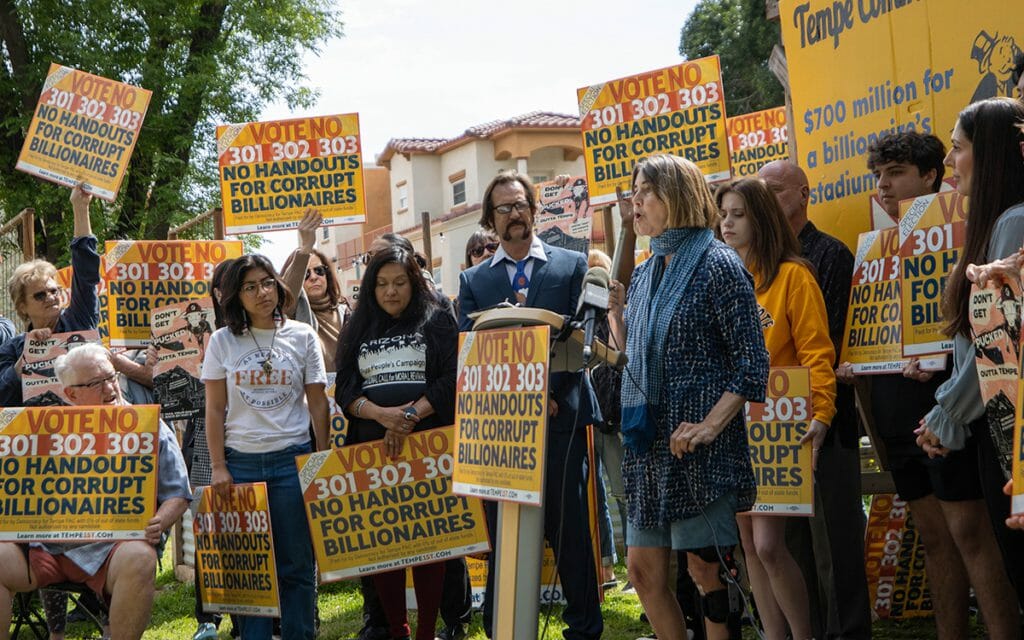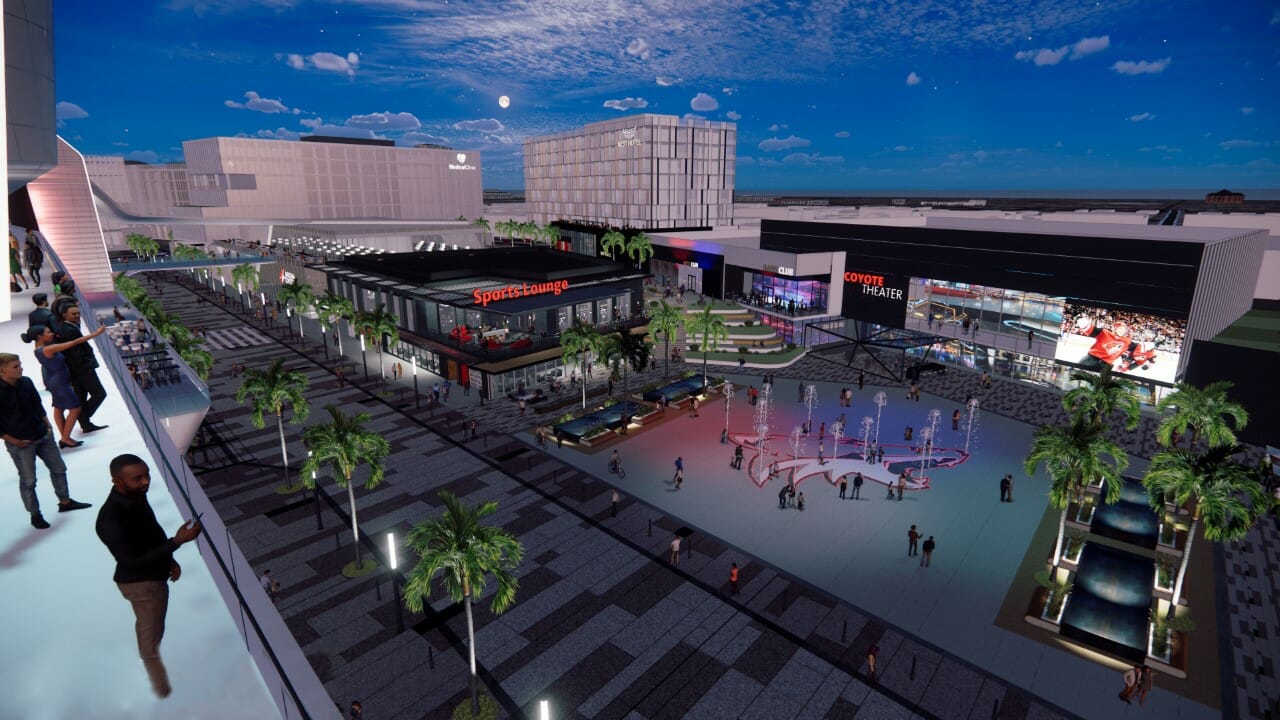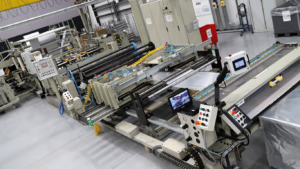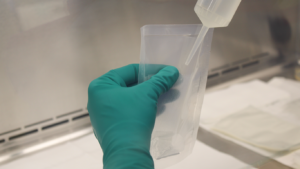With a special election looming to create an Arizona Coyotes arena and entertainment district in Tempe, a grassroots group is amping up its opposition to a more than $2 billion development deal with the NHL team’s owner.
DEEPER DIVE: How Novus Innovation Corridor is changing the game in Tempe
In an at-times theatrical news conference Monday, with residents in bow ties impersonating billionaires, the group Tempe 1st detailed why it opposes all three propositions that will appear on May’s special election ballot.
The group’s opposition is rooted in its position that Tempe could get a better development and tax deal for the city with more community input and a dedicated focus on sustainability.
“This is David and Goliath,” said former Tempe Councilmember Lauren Kuby, who is part of Tempe 1st. A “no” vote on all three propositions, according to the group, would provide the city more time to consult with residents, stakeholders and experts it said have been left out of negotiations.
Coyotes and Bluebird Development LLC owner Alex Meruelo has said the Coyotes will invest $2.1 billion in private funds, and the district will add more than 6,000 union jobs and other financial benefits and tax revenue to the area. Opponents say it is a costly deal and question Meruelo’s promises to be fiscally responsible given his past management of the Coyotes.

Late last year, the Tempe City Council agreed to send three propositions to voters this May to create a Coyotes Entertainment District that would include 2,000 apartments, a new hockey arena with 16,000 seats, and a complete entertainment district with businesses and gambling hubs on more than 45 acres of city-owned land west of Tempe Town Lake on Priest Drive and Rio Salado Parkway.
Proposition 301 would amend the city’s General Plan 2024 Land Use Map to facilitate the redevelopment of city-owned but commercially zoned property into a mixed-use project that would include the Coyotes franchise and entertainment district used for retail, restaurant, hotel, office and residential land purposes. Proposition 302 would rezone the city property, and Proposition 303 would uphold Tempe’s decision to authorize Mayor Corey Woods to sign off on a development and disposition agreement with Meruelo’s Bluebird Development LLC.
Charles Siler, a Tempe 1st volunteer, economist and government funding consultant, said the deal includes more than $500 million in tax breaks that will benefit Meruelo through two separate Government Property Lease Excise Taxes. GPLET is a tax-incentive agreement negotiated between a private party and a city. The state of Arizona established GPLET in the 1990s as a way to urge development in commercial districts by replacing property tax with an excise tax on specific goods or services charged at the time of purchase.
Tempe 1st is one of two political action committees battling for attention from Tempe voters before early voting begins April 19 for the May 16 special election.
Formed in December 2022, Tempe 1st is a grassroots bipartisan coalition of Tempe residents, small business owners and other community members. The opposition group had raised just under $2,000 by the end of 2022. The other PAC, Tempe Wins, run by Meruelo, had raised more than $224,000 by the start of 2023 in a single donation from Meruelo’s Bluebird.
Tempe 1st was sent a cease-and-desist letter last week from Tempe Wins that claimed signs calling Meruelo “corrupt” were damaging his reputation without justification. Dawn Penich-Thacker, a leader in Tempe 1st, called the letter “a desperate and undemocratic attempt to intimidate voters and silence residents.”
Tempe 1st has called out Meruelo for unpaid bills and his financial management while at the helm of the Coyotes while they were playing at Glendale’s Gila River Arena. The team relocated to the Valley from Canada in 1996, moving into Gila River Arena in 2003 after Glendale borrowed $183 million to build it.
In 2019, Meruelo bought 95% stake in the team, and just a year later the team was at least $500,000 behind in payments, according to the arena’s management company. After the 2021-2022 season, Glendale said it would not renew the Coyotes lease because of delinquent tax bills and unpaid arena charges.
At the Monday news conference, Andrea Soto, an Arizona State University sophomore studying justice studies and president of the Arizona Students’ Association, said young people care about things that she said would be threatened by the proposed development.
“We care about the environment, our water crisis, air pollution, respecting the land and fighting global warming. We care about all people having a safe and affordable place to live, not luxury condos,” Soto said. “We are not impressed by more part-time, low-wage jobs that don’t offer health care, and that’s if Meruelo even pays up. We have values and needs in our community that this developer and this proposal don’t even begin to address.”
The three propositions voters will see in May were first requested by Tempe in 2021, the Coyotes then proposing a $1.7 billion development using a portion of the city’s sales tax revenues. In the meantime, the Arizona Board of Regents signed a deal for the Coyotes to play in Mullett Arena on Arizona State University’s Tempe campus until 2025.
Gila River Arena had a seating capacity of 17,000 for hockey games whereas Mullett Arena seats 5,000. The arena in the proposed entertainment district would seat 16,000. The Canada Life Centre, home of the Winnipeg Jets, seats roughly 15,300 for hockey games and is one of the smaller NHL arenas. The largest is Bell Centre, home of the Montreal Canadiens, with more than 21,000 seats.
In a meeting with ASU’s student-run paper, The State Press last week, ASU President Michael Crow said the school worked with the hockey team on its use of Mullett Arena, but working on a bigger project like the entertainment district was “not in our wheelhouse.”
The school does not take positions on public referendums, and Crow told The State Press as far as he knows, the university is “not on any of the committees and on any of the structures.”
“I know Crow is very concerned about the culture of the university,” Kuby said. “ASU has put Tempe on the map. Our culture and our artistic community has put Tempe on the map. Some people are arguing this project is going to put Tempe on the map.”
Kuby, who is a senior global futures scientist at ASU’s Julie Ann Wrigley Global Futures Laboratory, called the development “ill-advised” on its environmental impacts. She said it ignores plans to conserve water, instead increasing water use, and is misinformed about soil preparation and remediation necessary to even think about breaking ground.
“I was on the council for two terms during this whole discussion,” Kuby said. “We built the proposal (the city’s general plan) just to attract one response, and that was the Coyotes.”
Tempe-based Asian American Native Hawaiian Pacific Islanders for Equity — which is also part of Tempe 1st — said the group is “compelled” to oppose the propositions. May Tiwamangkala, a director at the group, said gentrification harms communities of color and places where students live, work and play.
Fighting against “corporate greed” isn’t new for AAPI communities, Tiwamangkala said, making reference to a new stadium for the NBA’s Philadelphia 76ers.
In early January, 41 community groups in Philadelphia’s Chinatown grouped together to oppose an arena they said would displace an entire Chinese community that started in the 1870s for residents seeking protection from anti-Asian violence.
The groups said developers weren’t considering the broad impact on immigrants who historically create their own place for community and safety. The Philadelphia Chinatown Development Corp. has since conducted more than 230 surveys that show over 93% of business owners and residents oppose the arena.
“We cannot let these developers grab more land while the city ignores the demands of the community,” Tiwamangkala said, listing demands for affordable housing, public schools, support for small business, elder and child care and equitable solutions, among others.
“Our voices will become obsolete as we compete against the dollars that corporations use to lobby our elected officials,” Tiwamangkala said. “This isn’t just about sports. It’s about getting power back to the people so we can work together to revitalize the community. We don’t need a billionaire savior to put Tempe on the map.”
Toward the end of the news conference, two men dressed as billionaires in morning suits with bow ties and top hats mocked the district’s proponents.
“We are turning this into an entertainment district so that it’s not an East German style hellhole,” one of them said. “We’re turning it into a land grab. The Coyotes did so much for Glendale, so they want to come over here, they just want to generously spread the wealth to the underprivileged, blighted side of town that you are, Tempe. You’re welcome, plebeians.”




